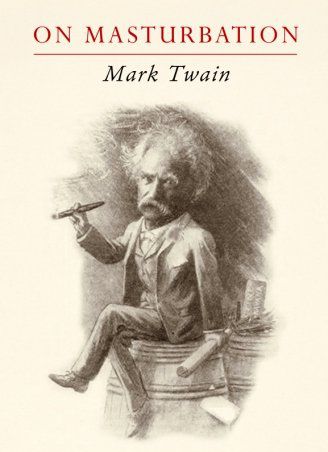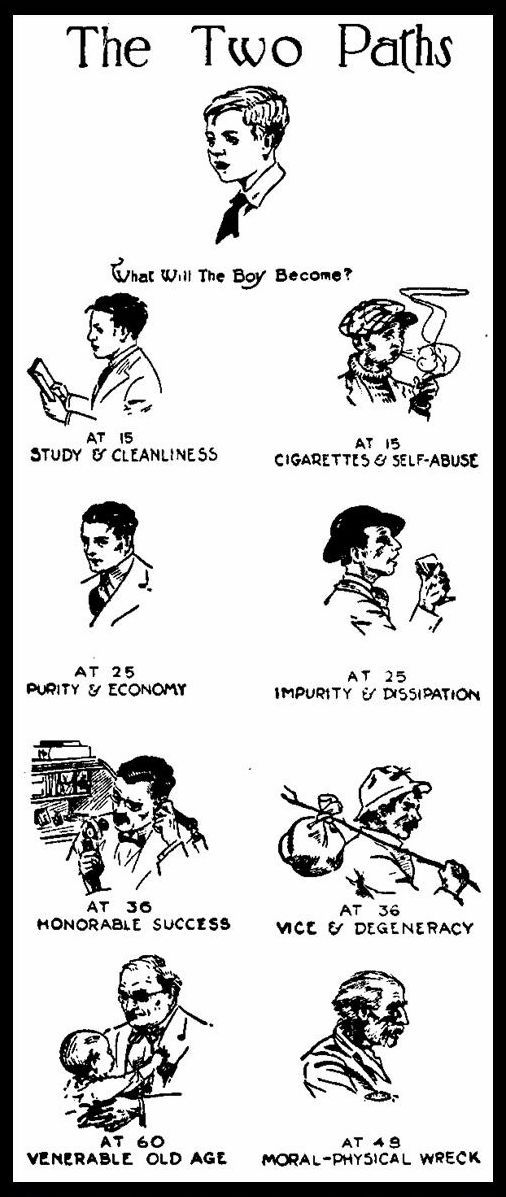马克·吐温《论手淫》
Mark Twain on Masturbation

“If you must gamble away your life sexually, don’t play a Lone Hand too much.”
In 1879, 44-year-old Mark Twain — irreverent adviser of little girls, pointed critic of the press, recipient of some outrageous requests from his fans — took the podium at a men’s club in Paris and delivered a lecture titled “Some Thoughts on the Science of Onanism,” onanism being masturbation, after the Bible’s Onan, who spilled his semen on the ground and was slain by God for this sinful transgression. The lecture was eventually adapted into On Masturbation (public library) and illustrated with charming Victorian-style engravings, but to fully understand just how scandalous Twain’s message was at the time, we ought to return to those Biblical admonitions.
In the Middle Ages, at the height of its rabid crusade to punish desire, the Catholic Church deemed masturbation a mortal sin deserving of eternal damnation. By Twain’s day, as medicine was beginning to split off from religious doctrine, doctors no longer claimed that God would slay those guilty of onanism, but did vehemently portend the harmful effects of self-pleasuring — or “self-abuse,” as it was referred to at the time. Admonishing that the perilous practice would even effect early death, they used medical warnings as a vehicle for the same old moral judgments stemming from religion. Victorian newspapers would regularly feature ads for male chastity belts, “scientific” pills to dampen desire, and even metal clamps designed to contain any unwanted “excitement.” Those, ironically, were marketed at treatments for rather than mechanisms of “self-abuse.”

A medical text from 1903 exemplifies the spirit of the era:
Teach your boy that when he handles or excites the sexual organs, all parts of the body suffer. This is why it is called “self-abuse.” The sin is terrible, and is, in fact, worse than lying or stealing. For, although these are wicked and will ruin the soul, self-abuse will ruin both soul and body. This loathsome habit lays the foundation for consumption, paralysis, and heart disease. It makes many boys lose their minds; others, when grown, commit suicide.
Twain, who reserved some of his sharpest critique for religion, thus unleashed his satire on both the cultural judgment of a practice so common yet so condemned, and on the sheepish religiosity that underpinned those judgments. His lecture pokes fun at those social attitudes by mashing up, more than a century before the Internet’s satirical mashups, famous words by cultural luminaries with thoughts on the subject of masturbation. Twain beings:
All great writers upon health and morals, both ancient and modern, have struggled with this stately subject ; this shows its dignity and importance. Some of these writers have taken one side, some the other.
Homer, in the second book of the Iliad, says with fine enthusiasm, “Give me masturbation or give me death!”
Caesar, in his Commentaries, says, “To the lonely it is company; to the forsaken it is a friend; to the aged and impotent it is a benefactor; they that be penniless are yet rich, in that they still have this majestic diversion.”
[…]
Robinson Crusoe says, “I cannot describe what I owe to this gentle art.”
Queen Elizabeth said, “It is the bulwark of virginity.”
Cetewayo, the Zulu hero, remarked that, “A jerk in the hand is worth two in the bush.”
The immortal Franklin has said, “Masturbation is the mother of invention.” He also said, “Masturbation is the best policy.”
Michelangelo and all the other Old Masters — Old Masters, I will remark, is an abbreviation, a contraction — have used similar language. Michelangelo said to Pope Julius II, “Self-negation is noble, self-culture is beneficent, self-possession is manly, but to the truly great and inspiring soul they are poor and tame compared to self-abuse.”
After running through a similar list of imaginary quotations from history’s masturbation-opponents, Twain plants a particularly well-aimed jab at religion by enlisting its arch-nemesis, evolution:
Mr. Darwin was grieved to feel obliged to give up his theory that the monkey was the connecting link between man and the lower animals. I think he was too hasty.
The monkey is the only animal, except man, that practices this science; hence he is our brother; there is a bond of sympathy and relationship between us. Give this ingenious animal an audience of the proper kind, and he will straightway put aside his other affairs and take a whet; and you will see by the contortions and his ecstatic expression that he takes an intelligent and human interest in his performance.
Twain proceeds to highlight the absurdity of condemning masturbation by offering a set of humorous diagnostic criteria for spotting those guilty of onanism and once again pokes fun at the purported effects of the practice:
The signs of excessive indulgence in this destructive pastime are easily detectable. They are these: A disposition to eat, to drink, to smoke, to meet together convivially, to laugh, to joke, and tell indelicate stories — and mainly, a yearning to paint pictures.
The results of the habit are: Loss of memory, loss of virility, loss of cheerfulness, loss of hopefulness, loss of character, and loss of progeny.
Twain concludes:
Of all the various kinds of sexual intercourse, this has the least to recommend it. As an amusement it is too fleeting; as an occupation it is too wearing; as a public exhibition there is no money in it. It is unsuited to the drawing room, and in the most cultured society it has long since been banished from the social board…
So, in concluding, I say: If you must gamble away your life sexually, don’t play a Lone Hand too much.
When you feel a revolutionary uprising in your system, get your Vendome Column down some other way — don’t jerk it down.
On Masturbation is a quick and delightful read in its entirety, and is available digitally for a rather guilt-free 99 cents. Complement it with Twain on religion and human egotism and his illustrated advice to little girls.
“如果你一定要在性生活上下赌注,不要单枪匹马地干太久”
1879年,44岁的马克吐温——不留情面的给小女孩的建议、对报刊尖锐的批评,接受一些他粉丝离谱的要求——在巴黎的一个男性俱乐部有了一个机会来举办一场演讲,演讲名为“关于科学的中断性交的一些看法,”在圣经中的奥南,那个将他的精液撒在地上而因这一罪恶的过错而被上帝杀死之后,中断性交就成了手淫。
这次演讲最后被改编成了《论手淫》(公共图书馆)并配以迷人的维多利亚式的版画来说明,但是为了彻底地懂得马克吐温的知识在那时是多么的具有诽谤性,我们应该回到这些圣经中的告诫中去。
在中世纪,是狂热的圣战惩罚意愿鼎盛时期,天主教会认为手淫是不可饶恕的大罪,应该被永远罚入地狱。在马克吐温的时代,当医学开始从宗教教义中分裂出来,医生不再坚称上帝会杀死这些犯交媾中断罪的人,但是也强烈的预示了自渎-或者当时所说的“自虐”的危害后果。并告诫说这种危险的行为甚至会导致早死,他们也把医学警告当做对同样渊远的来自宗教的道德判断的赋形剂。维多利亚时代的报纸经常有为男性贞操带打广告的专栏,“科学的”药物来抑制欲望,甚至设计了金属钳来遏制不需要的“兴奋”。而这些,很讽刺的被用来在治疗中而不是“自虐”机制中交易。
一份1903年的医学测试举例证明了那个时代的精神:你要告诉你的儿子当他操弄或者刺激 了性器官时,他的全身都会很痛苦。这就是为什么这被称为“自虐”。这是很可怕的罪恶,而且事实上比说谎或者偷盗更加糟糕。因为,尽管这两者很恶劣,会毁灭灵魂,自虐却会把灵魂和身体都毁灭。这种令人憎恶的习性为消耗性疾病、中风和心脏病埋下了祸根。它使许多男孩子迷失了心智;而且,当他们长大了,就会自寻了断。
吐温保留了一些他对宗教的最尖锐的批判,因此敞开怀了讽刺一个实践的文化判断太通俗但太不适用,以及用胆怯的宗教支撑的那些判断。他的演讲嘲笑了那些混搭的社会态度,比因特网的讽刺混搭——文化名人论及手淫的名言早了一个多世纪,
吐温的要素:
所有伟大的作家在健康与道德上,无论古今,都在这个庄严的话题上斗争着;这说明了它的高尚和重要性。一些作家持一种态度,一些持另外的态度。荷马,在伊利亚特的第二本书中,充满热情地说,“让我手淫或者让我去死!”凯撒,在他的传记中说,“对孤独的人来说它是伴侣;对被抛弃的人来说它是朋友;对年老的和阳痿的人来说它是恩人;对于那些不名一文的人来说,他们还是富有的,因为他们仍然有这个宏伟的消遣。”
[…>
《鲁滨逊漂流记》说,“我描述不出我所拥有的这个文雅的艺术。”
伊丽莎白女王说,“这是童贞的保障。”
塞奇瓦约,那个祖鲁英雄,评论道,“在手中得到一次安慰比在丛中两次都值得。”
那个流芳百世的富兰克林曾说,“手淫是创造的母亲。”他还说,“自渎是最好的策略。”
米开朗琪罗和其他的古时的大师——古时的大师是一个缩略词,一个缩写——曾使用过类似的言语。米开朗琪罗对教皇尤利乌斯二世说,“自我否定是高尚的,自学是仁慈的,沉着是有男子气概的,但是真正伟大并鼓舞人心的灵魂与自虐相比却是贫穷且平淡的。”
在浏览了一个类似的从历史中的手淫反对者的虚假引言后,吐温通过征募死对头的方式在宗教里植入了一个特别的全副武装的攻击,过程:
达尔文先生因为被迫放弃那个说猴子是人呵低等动物的连接环节的理论而感到很伤心。我觉得他太草率了。
猴子是除了人之外唯一实践了这个理论的动物;因此他是我们的兄弟;我们之间还有共感和血缘的联系。给这个聪明的动物一个适当类型的观众,他立刻就会撇开手头事物而对此感兴趣;你会看见在他的表演中带了智慧及怀有人的兴趣的他扭曲入迷的表情。
吐温开始用他给这些交媾中断的罪恶的幽默的诊断标准,及再次取笑对这种行为的后果的谣传,来强调谴责手淫的荒谬性:
.这种过度沉溺在此种消遣种的预兆很容易发觉。他们是这样的:一种吃、喝、吸烟、欢乐地聚在一起、笑、开玩笑、讲一个不文雅的故事的意向——最重要的,一种绘画的渴望。
这种习性的后果:丧失记忆,失去生殖能力,失去快乐,失去希望,失去性格,还失去子孙后代。
吐温的结论:
在所有的性交方式中,这是最不值得推荐的。作为一种娱乐它是短暂的;作为一种工作它是十分令人疲乏的;作为一种公共展览它赚不了钱。在上流社会它是不适宜的,而在有教养的社会里它早就被驱逐出社交平台了···所以,总而言之,我要说的就是:如果你一定要在性生活上下赌注,不要单枪匹马地干太久。当你发现在你的身体里发生了革命性的暴动时,让你的旺多姆柱以其他的方式——至少别用手卧倒。
《论手淫》总体来说是一次快速并使人愉快的阅读,而且只要99美分就可以轻松买到。辅助性的书籍有吐温的《宗教与人类的利己主义》和《给小女孩的阐释性建议》。